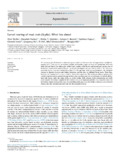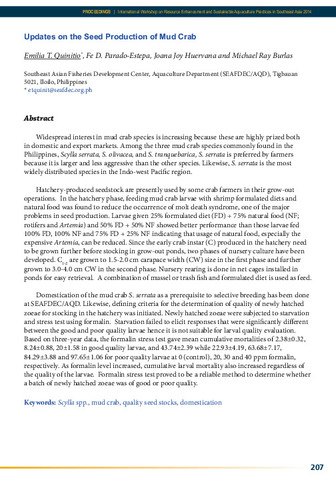| dc.contributor.author | Coloso, Relicardo M. | |
| dc.contributor.author | Catacutan, Mae R. | |
| dc.contributor.author | Peralta, Jose P. | |
| dc.contributor.author | Genodepa, Jerome G. | |
| dc.contributor.author | Duno, Khrsha | |
| dc.contributor.author | Gardoce, Rosthon | |
| dc.contributor.editor | Quinitio, Emilia T. | |
| dc.contributor.editor | Parado-Estepa, Fe Dolores | |
| dc.contributor.editor | Coloso, Relicardo M. | |
| dc.date.accessioned | 2017-08-25T09:05:33Z | |
| dc.date.accessioned | 2017-08-25T16:33:48Z | |
| dc.date.available | 2017-08-25T09:05:33Z | |
| dc.date.available | 2017-08-25T16:33:48Z | |
| dc.date.issued | 2017 | |
| dc.identifier.citation | Coloso, R. M., Catacutan, M. R., Peralta, J. P., Genodepa, J. G., Duno, K., & Gardoce, R. (2017). Pilot scale production of pellets suitable for mud crab Scylla serrata. In E. T. Quinitio, F. D. Parado-Estepa, & R. M. Coloso (Eds.), Philippines : In the forefront of the mud crab industry development : proceedings of the 1st National Mud Crab Congress, 16-18 November 2015, Iloilo City, Philippines (p. 153). Tigbauan, Iloilo, Philippines: Aquaculture Department, Southeast Asian Fisheries Development Center. | en |
| dc.identifier.isbn | 9789719931072 | |
| dc.identifier.uri | http://hdl.handle.net/10862/3188 | |
| dc.description | Abstract only. | en |
| dc.description.abstract | Studies were conducted towards the pilot scale production of stable and nutritionally adequate pellets suitable for mud crab Scylla serrata to help in efforts to increase mud crab production in the Philippines. Preliminary studies showed that mud crabs preferred pellets which were spherical or cylindrical and contained marine based attractants. Two practical diets were formulated and prepared in the Pilot Feed Mill of SEAFDEC/AQD. The extruded diets, along with a commercial mud crab grow-out diet, were subjected to proximate and Ca/P analyses as well as cholesterol analysis and water stability tests. The diets were fed to crabs in a controlled laboratory experiment using fiberglass tanks with flow-through, aerated seawater, and monitored from initial molt (M0) up to the second molt (M2). Tests revealed that the crabs fed Diet 1 (CP 48.28 %, CF 7.74 %, Ca 5.23%, P 12.93 %, cholesterol 0.173 %) showed the highest growth and better survival than those fed Diet 2 or commercial diet. Crabs fed Diet 1 took a shorter time to attain two molt cycles from M0. Survival was 70% after M2. Diet 1 was water stable within two hours. Abnormalities were observed including absent swimming legs or chelae, exposed gills, sores on exoskeleton, incomplete molting, or soft exoskeleton, but none that could be directly attributed to a specific treatment. Incomplete molting and slow hardening of the exoskeleton in crabs that accounted for the mortalities could be due to the low cholesterol levels in the diets especially in the commercial diet which had the lowest cholesterol level. Cholesterol supplementation of the artificial diet would be needed to improve molting success and survival of mud crabs in grow-out culture. The results of these experiments will be used to formulate a cost-effective grow-out diet for mud crab (supported by DOST-PCAARRD Grant in Aid). | en |
| dc.language.iso | en | en |
| dc.publisher | Aquaculture Department, Southeast Asian Fisheries Development Center | en |
| dc.subject | Scylla serrata | en |
| dc.subject | Philippines | en |
| dc.title | Pilot scale production of pellets suitable for mud crab Scylla serrata | en |
| dc.type | Conference paper | en |
| dc.citation.spage | 153 | |
| dc.subject.asfa | malformations | en |
| dc.subject.asfa | biological development | en |
| dc.subject.asfa | crab culture | en |
| dc.subject.asfa | diet | en |
| dc.subject.asfa | feeds | en |
| dc.subject.asfa | feeding experiments | en |
| dc.subject.asfa | growing ponds | en |
| dc.subject.asfa | marine crustaceans | en |
| dc.subject.asfa | moulting | en |
| dc.subject.asfa | survival | en |
| dc.citation.conferenceTitle | Philippines : In the forefront of the mud crab industry development : proceedings of the 1st National Mud Crab Congress, 16-18 November 2015, Iloilo City, Philippines | en |
| dc.subject.scientificName | Scylla serrata | en |



